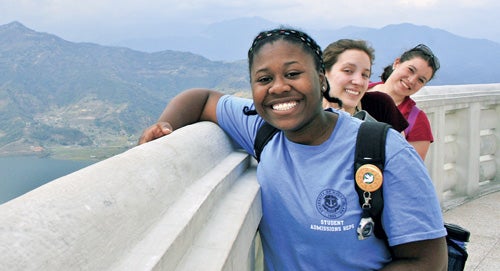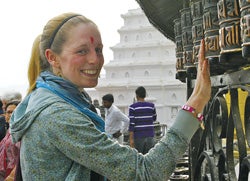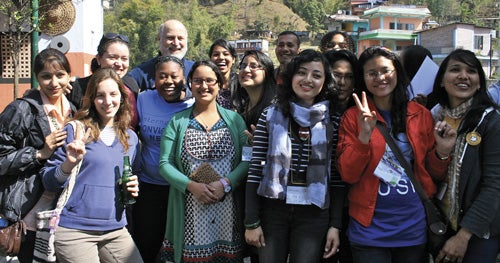A Peaceful Exchange in Nepal

Mallory Stedman carefully packed a medicine bag with a sacred feather when she traveled to Nepal this March.
The bag, blessed by the Narragansett tribe’s medicine man, contained cultural gifts from the tribe to give new friends—a kernel of corn to represent a source of nourishment, a seashell from Narragansett beach representing the tribe’s homelands. Then as is tradition, Stedman incorporated her own gift, choosing a glass peace sign in honor of her tribe.
“But none of the gifts compare to the gift that the trip in itself was. I will never forget my time in Nepal and the amazing, kind spirit of the Nepali people,” says Stedman, who majored in anthropology and is completing minors in the cultural aspects of textiles and in nonviolence and peace studies.

She was one of eight URI students who participated in an international alternative spring break sponsored by the URI Center for Nonviolence and Peace Studies. Psychology Professor Paul Bueno de Mesquita, the Silvia-Chandley Professor of Nonviolence and Peace Studies, who directs the center, and his wife, educator Kay Johnson, led the trip. Gillian Bell ’11, a certified Kingian nonviolence trainer and intern at the Nonviolence Center, accompanied the group as a co-trainer and videographer.
The URI group engaged in Kingian nonviolence training with their Nepalese counterparts from Tribhuvan University, members of the Collective Campaign for Peace, a national network of peace and human rights non-governmental organizations, and Social Work for Development, an organization of activists led by social workers committed to peace. Kingian nonviolence is often cited for its practical methodology.
The Nepal program serves as a model of an applied experiential learning opportunity for URI students to develop both knowledge and skills at the intersection of global change and social responsibility; it is consistent with the University’s strategic plan articulated by President David M. Dooley.
The Center for Nonviolence and Peace Studies
For the past dozen years, URI’s Center for Nonviolence and Peace Studies has lived up to its founding principles to institutionalize and internationalize nonviolence as a process that fosters mutual understanding among people, reconciles conflicts, and builds peaceful, sustainable, and inclusive communities that promote human rights and economic and social justice.
To accomplish that, the center offers various types of training depending on the needs of the organization, agency, school, or community group. The trainings introduce methods and practices with the intent of developing nonviolence leaders, educational programs, and training centers.
URI nonviolence trainers have brought nonviolence and peace to places as far away as Colombia, Nigeria, and the Middle East and as close as Central Falls and Chariho schools in Rhode Island.
This June, the center hosted its annual International Summer Nonviolence Institute, which brought together people in different fields from across the U.S. and around the world. URI students can minor in nonviolence and peace studies and become lifelong peace advocates. To learn more, go to uri.edu/nonviolence/. ”
Located in the Himalayas, Nepal is bordered by the Tibetan regions of China and India. It was a monarchy until the 1990s, when a people’s movement peacefully overthrew their ruler to establish a democratic government. However, a Maoist revolutionary insurgent group attempted to take power, and a decade of violence and civil war ensued. The fighting ended in 2008, a coalition formed, and a constitutional assembly was elected. For the past four years, attempts to write a constitution have been unsuccessful and a political stalemate has enveloped the country.
Reflections on Training
“While there is an absence of violence in Nepal, there is a fragile state of peace,” says de Mesquita. “People are hungry to learn nonviolence alternatives for social change. Our students were incredible trainers and each brought a unique perspective to Nepal that contributed to an overall understanding to carry Nepal forward.”
“Nepali nonviolence is deeply rooted in the Gandhian tradition, which also influenced the development of Martin Luther King Jr.’s ‘American’ nonviolence. I don’t see our ideas of nonviolence as different ideologically, just chronologically,” says Bell.
“Whenever you conduct a training, it’s important to use life issues and conflicts. It makes the experience more tangible,” says Michaela Cashman, who credits her introduction to nonviolence methods to her fifth grade class at Wakefield (R.I.) Elementary School for shaping her life: “The Nepali participants focused on issues such as sex trafficking, caste systems, constitution delay, and environmental degradation. No topic was too large or too complicated. It made me hopeful for the future of their country.
“I earned a degree in environmental science and management in May, so it’s easy to incorporate nonviolence. Every day, I watch small-scale conflict over development versus preservation. As population grows, our struggles with water, oil, air, open space, and food will only continue to grow. It’s important to spread the tools of nonviolence communication and resolution to all fields of study. We have to find a way to strengthen our communities in order to make positive change,” says Cashman, who plans to take a year off before entering graduate school. “URI has opened so many doors for me, it’s hard to choose just one area of study I’d like to concentrate on just now. “

Mecca Smith, a cultural anthropology and film/media double major with minors in nonviolence and peace studies, leadership, and international development, found everyone in Nepal to be passionate about peace building and planning how to deal with social conditions in their country. “The issues are urgent, since the country has an approaching timeline to create their constitution,” she says. “I enjoyed seeing all of the different terrains—the Himalayas, caves, waterfalls, rural terraced farmland, the lakes, forests, and the cities. The people were just as diverse as the land.”
Smith became involved with peace studies during a summer job working for The Institute for the Study and Practice of Nonviolence in Providence as a camp counselor at a youth art center called Cityarts! Each Friday, she attended seminars hosted by the Institute and learned about Martin Luther King Jr.’s principles of nonviolence.
When she arrived at URI, she discovered the Center for Nonviolence and Peace Studies. “Since then, I have had a great time taking classes and learning about peace studies on campus,” says Smith, who will be a senior in the fall.

Soaking Up the Culture
The group trained in Pokhara, about 150 miles outside of Kathmandu. The city is located on the shores of Phewa Lake, known for its tranquility and natural beauty, and is surrounded by the snow-capped Annapurna mountain range. Before returning home to the U.S., the URI contingent visited historic Hindu and Buddhist temples and shrines and spent time at the Chitwan National Park and Wildlife Refuge, designated as a World Heritage site in 1984, with more than 43 species of animals and about 450 species of birds. They also had the opportunity to ride elephants.
“I will never forget the way an elephant’s skin feels like a giant version of a house cat’s sandpaper tongue, or the way it slides underneath your knees as the majestic creature ambles through a stream. There is nothing that reminds you that you are simultaneously tiny and insignificant, and infinitely connected with everything in the universe, like a ride on an elephant’s back,” Bell says.
Environmental Challenges in Nepal
“Nepal is among the poorest countries in the world, but I will always remember the grace and beauty of its natural landscapes, contrasting so sharply with the evidence of the needs of an increasingly crowded population plummeting into a modernized world,” says Bell. “ I’ll remember families whizzing by our bus in Kathmandu, all with cotton facemasks to avoid the dust and smog, riding on one motorbike; the six-inch margin between the wheels of our tour bus and a 500-foot cliff down to a beautiful aqua river’s edge; cows roaming free in the streets of some of Nepal’s largest cities nibbling at trash on the side of the road, left there because there is no infrastructure for its removal.”
Dancing In the Streets
Erica Munoz, a communicative disorders major, discovered Nepali hospitality and warmth a few hours after she arrived. “We had just left Durbar Square in Bhaktapur when we heard this amazing drumming and music. It was a wedding celebration in the street. Immediately I started filming the circle of dancing girls and the men and their dance-offs,” says the Cumberland, R.I., resident who will be a senior this fall.
“I couldn’t help but bob my head to the music. I was enjoying watching when a man tapped me on my shoulder and enthusiastically asked me if I wanted to join. I shyly but definitely said yes, and from nowhere a girl dressed in fancy Nepali clothing grabbed my hand and rushed me into the circle. Everyone in the circle was excited I was there, showing me the moves as we danced.”

One Door Closes, Opportunity Opens Another
“Many opportunities, if taken, will change your life for the better,” says Mike Petrarca ’12. “ I say this because my trip to Nepal only occurred because I forgot to hand in my intent to graduate form on time (a story in and of itself), and I ended up gaining a new perspective on life.
“Not only did I gain an in-depth understanding of Nepal as a country and of nonviolence practices, but I also learned a great deal about myself. Sometimes it takes really stepping out of your comfort zone to realize exactly the kind of life you live in comparison to the rest of the world.”
Petrarca extended his trip an extra week to trek in the Langtang region of the Himalayas. “The jungle and mountain peak views were breathtaking, and I had such a great cultural experience as I trekked alone and was forced to battle the language barrier between the local Nepali mountain people and myself,” says the Coventry, R.I., native who graduated this May with a communication studies degree.
Healthy Application of Peace
As the assistant coordinator for the National Student Exchange Program at the University’s International Center who also provides support services to international students, Andrea Russell developed a passion for learning about other cultures and building global relationships. Since she’s been at URI, the Bedford, N.H., native has spent a semester in South Africa and a spring break in South Korea as a student ambassador with the Korea Foundation and Yonsei University.
A recipient of a Provost Undergraduate Research Award, Russell researched transitional justice mechanisms in Nepal’s nation-building process for her senior honors project, surveying and interviewing Nepali participants and experts who visited the training. “Most thrilling was the chance to meet and speak one-on-one with Krishna Pahadi, Nepal’s leading human rights activist,” she says.
The pharmacy student will begin her yearlong clinical rotations this summer before beginning her career in the U.S. Air Force. “Conflict is inevitable when working as part of a health care team, or working with people in any environment, and I expect that the nonviolence techniques I have learned will be invaluable.”
Leadership Roles
“Instead of simply describing global problems, these students are better equipped to lead in the design of global solutions. For many, if not all of our students, the trip was a transformational experience,” says Bueno de Mesquita. His trip to Nepal last year and visits by Nepalis to the URI International Summer Nonviolence Institute inspired him to create the alternative spring break trip this year.
Another training trip to Nepal will be offered next spring and a more formal partnership with COCAP, SWD, and Tribhuvan University’s Peace and Conflict Development Studies Program is in the works.
By Jan Wenzel ‘87
 Home
Home Browse
Browse Close
Close Events
Events Maps
Maps Email
Email Brightspace
Brightspace eCampus
eCampus


